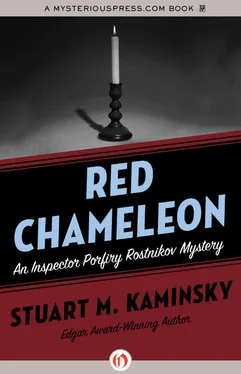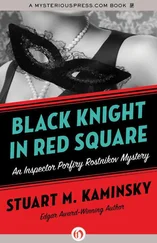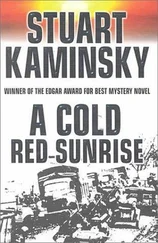Stuart Kaminsky - Red Chameleon
Здесь есть возможность читать онлайн «Stuart Kaminsky - Red Chameleon» весь текст электронной книги совершенно бесплатно (целиком полную версию без сокращений). В некоторых случаях можно слушать аудио, скачать через торрент в формате fb2 и присутствует краткое содержание. Год выпуска: 2012, ISBN: 2012, Издательство: MysteriousPress.com/Open Road, Жанр: Полицейский детектив, на английском языке. Описание произведения, (предисловие) а так же отзывы посетителей доступны на портале библиотеки ЛибКат.
- Название:Red Chameleon
- Автор:
- Издательство:MysteriousPress.com/Open Road
- Жанр:
- Год:2012
- ISBN:978-1-4532-6632-8
- Рейтинг книги:4 / 5. Голосов: 1
-
Избранное:Добавить в избранное
- Отзывы:
-
Ваша оценка:
- 80
- 1
- 2
- 3
- 4
- 5
Red Chameleon: краткое содержание, описание и аннотация
Предлагаем к чтению аннотацию, описание, краткое содержание или предисловие (зависит от того, что написал сам автор книги «Red Chameleon»). Если вы не нашли необходимую информацию о книге — напишите в комментариях, мы постараемся отыскать её.
Red Chameleon — читать онлайн бесплатно полную книгу (весь текст) целиком
Ниже представлен текст книги, разбитый по страницам. Система сохранения места последней прочитанной страницы, позволяет с удобством читать онлайн бесплатно книгу «Red Chameleon», без необходимости каждый раз заново искать на чём Вы остановились. Поставьте закладку, и сможете в любой момент перейти на страницу, на которой закончили чтение.
Интервал:
Закладка:
“Drive carefully,” Ilya hissed between closed teeth.
“Next time I’ll hit the dog,” she said jokingly.
It was then that he found the report among the papers in the glove compartment and almost threw up on the freshly scented seat of the newly shampooed Chaika. He controlled the hot, vile, small ball of fear that rose from his stomach to his throat and spoke as calmly as he could, which, he was sure, was not calm at all.
“This car belongs to the deputy procurator general at Moscow,” he said, almost in a whisper.
“No,” Marina replied calmly, looking out of the window, her arm on the open window as she glided along like a movie star. “It belongs to us.”
The train ride back from Yekteraslav was hell. Zelach brooded, pouted, almost sucked his thumb. He shifted and squirmed and demanded more attention than a petulant child. Rostnikov’s leg hurt at the knee, and he couldn’t read. He knew he would have to face Sarah’s growing anguish if she hadn’t found work. He worried about Josef, his son, and wondered why there had been no letters from him in Kiev for almost three weeks. Rostnikov tried to build a tale from the bits of information he had gathered about the old men in the photograph. Nothing came. He put the book aside and turned to Zelach.
“Why the brass candlestick?” he said.
Zelach shrugged.
“Hidden value? An antique?” Rostnikov went on as the train rattled forward, buzzing electrically. There were few passengers going toward the city in the late afternoon. Passengers were going the other way, away from Moscow as the workday ended. It had not been difficult to catch a train. They ran frequently, a tribute to the efficiency of the system, according to Emil Karpo. Rostnikov had once suggested to Karpo in return that it demonstrated quite the reverse. Because the train system had to meet its quota of hours in service, trains often ran empty, sometimes in the middle of the night, wasting power. They were ghosts, zombies plodding forward to meet quotas like the vest factory in Yekteraslav. Rostnikov had discovered that the vest factory often went twenty-four hours in ceaseless production of second-rate vests for which there was no market. Work quotas had to be met. People had to be kept busy.
“It may have been incriminating,” Rostnikov went on.
“What?” Zelach answered drowsily.
“The brass candlestick the killers took from the Savitskaya apartment.”
Zelach shrugged. The candlestick held no interest for him. His impulse toward enthusiasm had waned with the afternoon. Zelach was exhausted from two days of effort to impress the Washtub. The trip and that leathery old man had proved too much for Zelach. A conductor came past to check tickets, and Zelach scowled at him. Zelach would gladly have paid his own way back to that town for the joy of crushing the skull of that old man on the porch who had led to Zelach’s humiliation.
“Fifty years, more than fifty years, can you imagine that?” Rostnikov said, folding his hands on his lap over the American novel. “Perhaps the very year I was born, maybe even before, these young men are together in this little village, friends, and then … what?”
“What?” said Zelach, not caring what or who or why or when.
Rostnikov turned his face to his subordinate. “Where is your soul, Alexei Stepanovich Zelach?”
“There is no such thing as a soul,” Zelach said, trying to hide his irritation.
“Fine,” Rostnikov agreed. “Then you have no soul. Where is your curiosity? What do you think of? What drives you each day, gets you out of bed, into that old suit?”
“I’m not a philosopher,” Zelach said uncomfortably.
“I didn’t ask for philosophy,” Rostnikov sighed. “I was seeking conversation.”
“I’m not very good at talking, chief inspector. You are well aware of that.”
Rostnikov considered returning to his book, but he knew Zelach would find some way to gain his attention. Rostnikov had made up his mind. He would find some diversion for Zelach, something to keep the man busy and, he hoped, useful, something to keep him as distant as possible while Rostnikov worked on the murder of Abraham Savitskaya.
“Are we working tonight?” Zelach said, looking out the window at the first tall buildings that indicated they were approaching Moscow. “I’ll get some sandwiches and bring them to the office.”
“No,” said Rostnikov. “Go home. In the morning I will have a new assignment for you.”
Zelach grunted and looked out the window at the familiar surroundings of Moscow.
It was almost seven in the evening when Rostnikov got to Petrovka Street. He had fought the crowds with success and emerged a bit weary from the Sverdlov Square metro station. The sun was almost down and the evening not quite so hot as he crossed the square, went through the park, around the Karl Marx monument, and waited patiently for the traffic to slow so he could limp across Marx Prospekt and move past the shadow of the massive USSR State Academic Bolshoi Theatre.
Minutes later he stepped into Petrovka, the twin ten-story buildings that house the police operations of the city of Moscow. The buildings are modern, utilitarian, and always busy. The people of Moscow know where to find Petrovka, for it is not hidden, nor are the thousands of gray-clad policemen who patrol the city. Indeed, the ratio of police to populace is higher in Moscow than in any other major city of the world.
In spite of this, crime, while it does not flourish, exists. Files of poznaniye, or inquiries, cover the desks of the procurators working under the procurator general of the Soviet Union. The police work with the procurators in the twenty districts of Moscow and are responsible for all but political crimes. Political crimes fall within the sphere of the KGB (Komitet Gosudarst-vennoi Beszopasnosti), or State Security Agency. It was a constant puzzle to Porfiry Petrovich Rostnikov what a political crime might be. Economic crimes are generally political, because they threaten the economy of the state and are subversive. In fact, however, Rostnikov knew that any crime could be considered political, even the beating of a wife by a drunken husband. Officially, the procurator general’s office is empowered by the constitution (Fundamental Law) of the Union of Soviet Socialist Republics, adapted at the Seventh (Special) Session of the Supreme Soviet of the USSR, Ninth Convocation, on October 7, 1977, according to Article 164, to exercise “supreme power of supervision over the strict and uniform observance of laws by all ministries, state committees and departments, enterprises, institutions and organizations, executive-administrative bodies of local Soviets of People’s Deputies, collective farms, cooperatives, and other public organizations, officials, and citizens.”
When he entered the station, Rostnikov planned to head for his small office on the fifth floor, pick up any messages, take care of them, sit quietly in the solitude of his only place of refuge outside the toilet in his apartment, and rest for an hour or two before going home. He planned, of course, to call his wife and give her a half lie about his tardiness, but it would only be a half lie if there was no work to do. He would spend the time doodling on the sheets of rough paper and thinking about the old Jewish man in the bathtub and his daughter, this frightened daughter with the leg as stiff as his own.
However, he did not get to his office right away. As he entered the building, the uniformed officer at the desk, behind whom stood another uniformed officer with a ready Sten gun, called to Rostnikov.
“Inspector,” the man called. “The assistant procurator wants you to come to his office the moment you arrive.”
Rostnikov nodded and made his way to the elevator. It was late for the deputy procurator still to be in. The former deputy, Anna Timofeyeva, had spent as much as eighteen hours a day working until her heart attacks had sent her into retirement in a one-room apartment shared by her cat, Bakunin.
Читать дальшеИнтервал:
Закладка:
Похожие книги на «Red Chameleon»
Представляем Вашему вниманию похожие книги на «Red Chameleon» списком для выбора. Мы отобрали схожую по названию и смыслу литературу в надежде предоставить читателям больше вариантов отыскать новые, интересные, ещё непрочитанные произведения.
Обсуждение, отзывы о книге «Red Chameleon» и просто собственные мнения читателей. Оставьте ваши комментарии, напишите, что Вы думаете о произведении, его смысле или главных героях. Укажите что конкретно понравилось, а что нет, и почему Вы так считаете.












